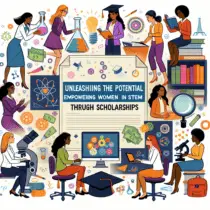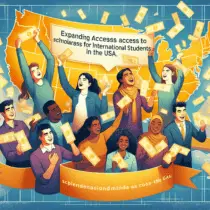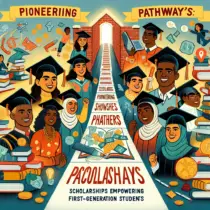Unleashing the Potential: Empowering Women in STEM Through Scholarships
When it comes to pursuing careers in science, technology, engineering, and mathematics (STEM), women have historically faced numerous barriers and obstacles. However, times are changing, and initiatives aimed at empowering women in STEM have gained momentum in recent years. One such initiative that has proven to be highly impactful is providing scholarships specifically designed for women pursuing STEM degrees. These scholarships not only help break down financial barriers but also foster a supportive environment that encourages more women to excel in the field. By unleashing the potential of women in STEM through scholarships, society as a whole can benefit from a more diverse and inclusive scientific community.
Women have made significant contributions to various scientific fields throughout history, but they remain underrepresented in many STEM disciplines. According to the National Girls Collaborative Project, women make up only 28% of the workforce in science and engineering occupations. This gender disparity is even more pronounced at higher levels of academia and industry leadership positions. The lack of representation not only hampers gender equality but also limits the creative potential and innovation that diverse perspectives bring to scientific research and development.
Breaking Financial Barriers
One of the major obstacles preventing women from pursuing careers in STEM is the high cost associated with education and training. Scholarships specifically targeting women in STEM disciplines can help alleviate these financial burdens by providing financial assistance for tuition fees, textbooks, research materials, and other educational expenses. By removing or reducing these financial barriers, scholarships enable more young women to pursue their dreams of studying STEM subjects without having to worry about the financial strain.
Funding for these scholarships often comes from organizations dedicated to promoting gender equality and advancing diversity in STEM fields. These organizations recognize the importance of empowering women with opportunities for higher education and professional growth. Scholarships not only provide financial support but also send a powerful message to women that their potential is valued and that they deserve equal opportunities in STEM.
Fostering Supportive Communities
Another critical aspect of empowering women in STEM through scholarships is the creation of supportive communities. Many scholarship programs offer mentorship opportunities, networking events, and access to resources that can help women thrive in their chosen fields. The isolation often experienced by women in male-dominated industries can be mitigated through these support systems, fostering a sense of belonging and empowerment.
Mentorship programs match female students with experienced professionals who can provide guidance, advice, and encouragement throughout their academic journey and beyond. These mentors serve as role models, sharing their own experiences and helping young women navigate the challenges they may face in STEM careers. By having access to these resources and connections, scholarship recipients can build strong networks that open doors to internships, research opportunities, and job placements.
The Benefits of Women in STEM
Encouraging more women to pursue careers in STEM has far-reaching benefits for individuals, industries, and society as a whole. Firstly, it leads to greater gender equality by breaking down traditional stereotypes and biases associated with scientific fields. When women succeed in STEM disciplines, they challenge societal norms and inspire future generations of young girls to follow their passion for science.
Diversity in STEM also enhances innovation and problem-solving capabilities. Research shows that diverse teams generate more innovative ideas and solutions due to the inclusion of different perspectives. By empowering more women through scholarships, we unlock the untapped potential for creativity and ingenuity that is essential for tackling complex challenges facing our world today.
FAQs
1. Are there specific scholarships available for women in STEM?
Yes, many organizations offer scholarships specifically for women pursuing degrees in STEM fields. Some examples include the Society of Women Engineers (SWE) scholarships, National Science Foundation (NSF) scholarships, and the Women Techmakers Scholars Program.
2. How can I apply for these scholarships?
Each scholarship program will have its own application process and requirements. Start by researching organizations that offer scholarships for women in STEM and carefully review their eligibility criteria and application deadlines. Be sure to gather all necessary documents and prepare a compelling application highlighting your achievements, goals, and passion for STEM.
3. Can men also apply for these scholarships?
While these scholarships are primarily aimed at empowering women in STEM, some programs may have specific eligibility criteria that also allow men to apply. It is essential to read the scholarship requirements thoroughly to determine if men are eligible.
4. What are some other ways to support women in STEM?
Besides scholarships, there are numerous ways to support women in STEM. Encouraging girls to pursue interests in science and mathematics from a young age can help foster their passion for these subjects. Additionally, creating mentorship programs, promoting inclusive work environments, and challenging gender biases within academia and industry can all contribute to empowering women in STEM.
5. How do scholarships benefit the wider scientific community?
Scholarships benefiting women in STEM contribute to a more diverse and inclusive scientific community. By increasing gender representation, scholarship programs help overcome the underrepresentation of women in key scientific fields, leading to broader perspectives and fresh ideas. This, in turn, drives innovation and advances scientific research for the betterment of society.






